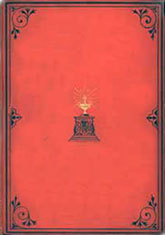The Coming Race
Critique • Quotes
 First edition
First editionAlso known as
Vril: The Power of the Coming Race and The New Utopia
First publication
1871
Literature form
Novella
Genre
Science fiction
Writing language
English
Author's country
England
Length
Approx. 52,500 words
The Vril of it all
It's an irony of sorts that Edward Bulwer-Lytton's most influential book may be his last, one of his shortest, written in a genre different from everything else he had done to that point, and not even published under his own name. Yet it was greatly admired and popular in its time.
But don't let any of that make you think The Coming Race (1871) must have been the best written work from the author whose name has come down to us as nearly synonymous with bad writing.
If The Coming Race is remembered and read today more than most of Bulwer-Lytton's writing, it is mainly for being an early exercise in speculative writing, a proto-science fiction story.
To get more specific, it has a honoured place in the development of the fantastic journey story, in the line of Jonathan Swift's Gulliver's Travels (1726), Jules Verne's Journey to the Centre of the Earth (1864), Samuel Butler's Erewhon (1972), and Arthur Conan Doyle's The Lost World (1912)—with nods to other subgenres like utopian/dystopian literature, science fiction romances, lost world discoveries and social satire. When Erewhon appeared—also anonymously—the year after The Coming Race, it was taken by many to be a sequel by Bulwer-Lytton.
None of which however should give the idea that The Coming Race is written much differently from Bulwer-Lytton's other works. It is just as dense, stiff, and convoluted as everything else he produced. Here's a passage on the death of the narrator's friend near the beginning of the exploration:
But he had scarcely accomplished ten feet of the descent, when the fastenings, which we had fancied so secure, gave way, or rather the rock itself proved treacherous and crumbled beneath the strain; and the unhappy man was precipitated to the bottom, falling just at my feet, and bringing down with his fall splinters of the rock, one of which, fortunately but a small one, struck and for the time stunned me.
The body is taken by a monster and that's pretty well the last thought the narrator gives to his friend's horrible fate for the rest of the novel.
It is hard to understand why masters like Charles Dickens and Edgar Allan Poe, who never would have written such bloodless sentences, were so enamoured with Bulwer-Lytton and this work in particular.
Force of will
The author is also given credit for his technological predictions in The Coming Race and and for placing his fantastic story on a scientific basis. In neither way does he come anywhere near Jules Verne. But two phenomena in the novel can earn him some scientific kudos. The most commonly noted is the subterranean people's use of a force they call vril, which, like the later discovered nuclear energy can be found in all things. It is tapped into, however, by force of will exerted by spiritually advanced people, whatever that means. The fictional force became so popular at the time that a food manufacturer in the 1870s named his beef-extract paste Bovril, which is still available.
It is also remarked that the subterranean people have developed through natural evolution, a relatively new theory at the time. The mechanics of it are vague, with suggestions the vril people diverged from our stock after taking up residence underground to escape the great flood of the Bible. I'm not sure how life below fostered their particular genetic changes or led to their technological achievements such as learning to fly with angel-like wings. I would have thought evolution would take them in other directions, as it did the Morlocks in H.G. Wells's The Time Machine (1895).
As in many of the strange journey or utopian/dystopian novels, the discovered world's society is explicated so as to be compared with our own. Most striking are the different roles of males and females in vril society—with females being the strongest, most dominant sex, at least until marriage. Sort of halfway feminist, which was far in advance of Bulwer-Lytton's own time.
The bulk of the novella really is just the narrator hanging around the vril, studying and reporting on them and their world. After the discovery of the underground world, there is precious little plot apart from some pointless romancing, until near the end when it's time for our hero to try to escape the underworld and warn us surface dwellers about the coming of this dangerous race.
Exciting stuff for the time, I suppose, but readable today only for those interested in the literary history of a genre.
— Eric
Critique • Quotes

